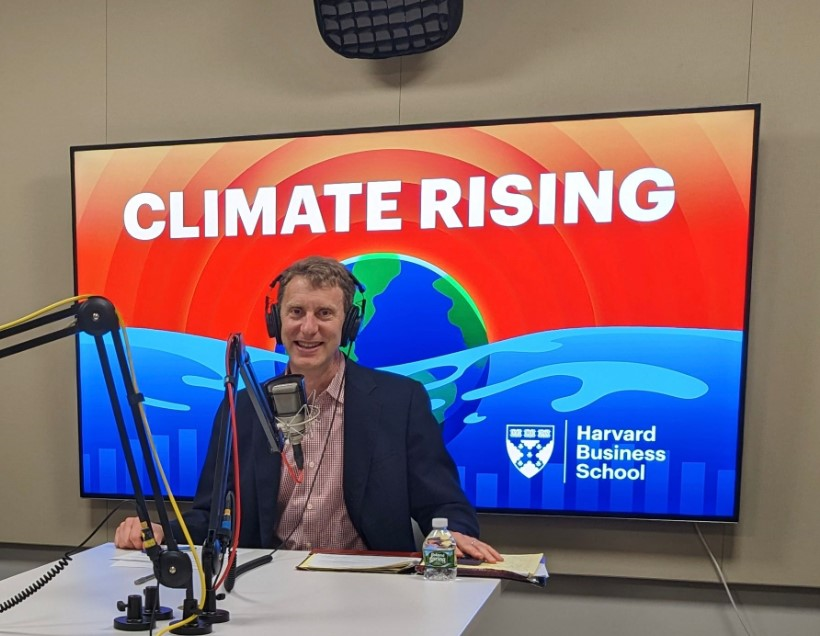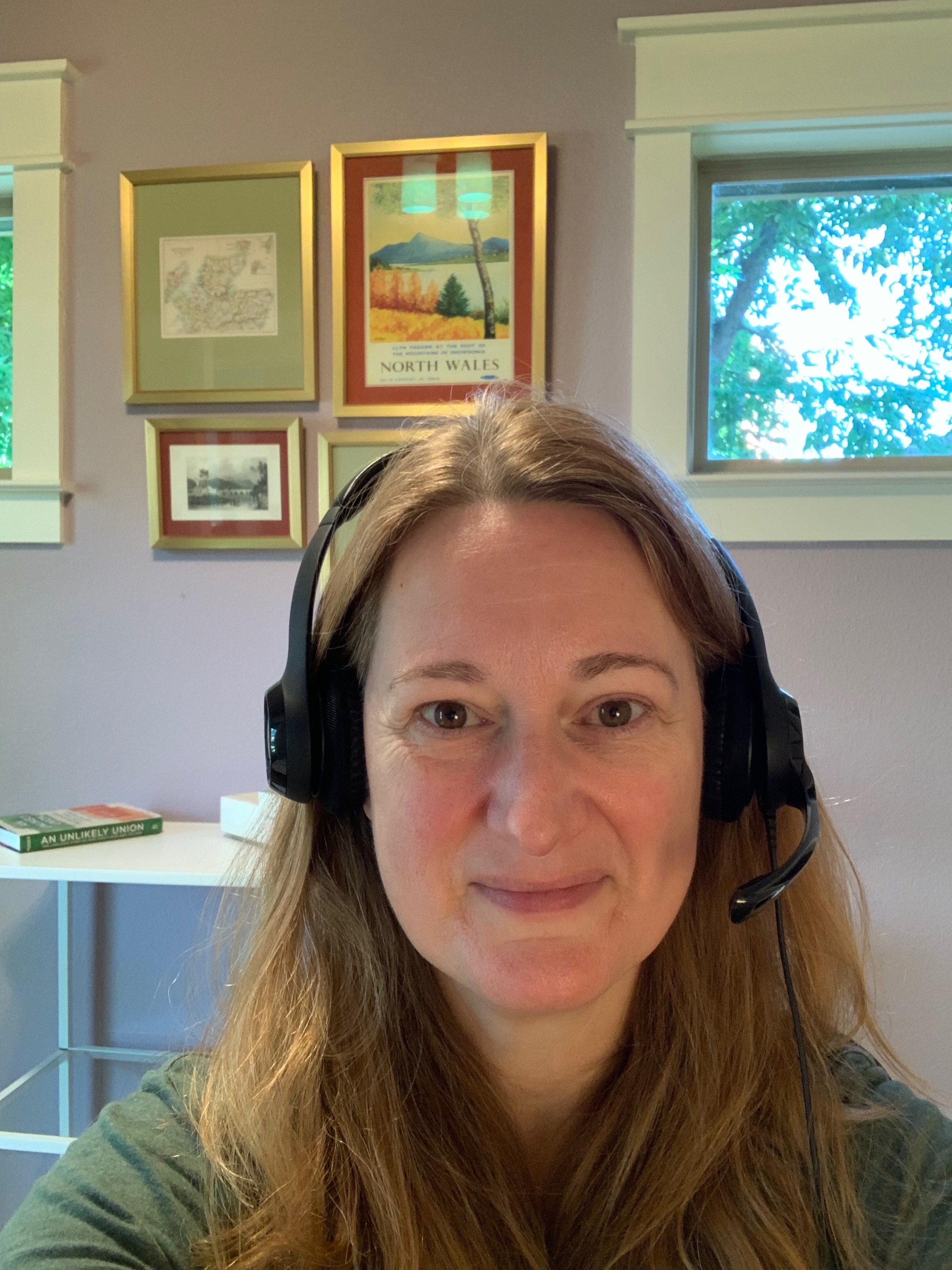Recently, Climate Rising, Harvard Business School’s business and climate change podcast, marked our 50th original episode.
Launched in 2019, the podcast has come a long way, and “turning 50” provides an opportunity to look back and reflect on its evolution.
The origins of the show
In 2019, the HBS Business and Environment Initiative (BEI) leadership team, then-BEI Director Jennifer Nash and BEI Faculty Chair and Senator John Heinz Professor of Environmental Management Mike Toffel, sparked the idea for the podcast. They thought it could provide a new channel for education, research, and outreach. They thought the podcast could educate those interested in careers at the intersection of business and climate change by exposing them to the myriad of paths such a career could take—from Chief Sustainability Officer to climate tech entrepreneur to management consultant to non-governmental organizations, and everything in between. They also hoped the podcast’s focus on managers would enable faculty and students at HBS and beyond to discover new insights, research ideas, and business opportunities. Finally, they wanted the podcast to help convey that HBS is taking seriously the challenges and opportunities that climate change poses for business and for management education.

Climate Rising has pursued several approaches to achieve these objectives, including engaging several hosts including Boston Globe environment reporter David Abel who provided a journalist lens, and Harvard Innovation Labs Senior Advisor for Social Impact Rebekah Emanuel who brought a focus on entrepreneurship and innovation, and then Mike Toffel who shifted the focus to developing sets of 4-6 episodes clustered around topical themes and who brought in a senior researcher and producer with experience writing about a range of business and environment topics for a generalist audience (me). Since the beginning of 2022, we increased our cadence to release episodes every other week in order to more regularly engage with listeners. Along the way, HBS MBA students and summer interns conducted research and recommended topics and guests. Over the past year, we sought to broaden our exposure by pursuing cross-promotions and feed swaps with a few other climate-related podcasts, which also served to introduce other interesting podcasts to our listeners.
Themes
Our first themed series in 2022 covered several angles of corporate decarbonization—from HP’s climate plan to startup BlocPower’s strategy to electrify and decarbonize buildings, Aspen Institute’s collaborative initiative to help decarbonize ocean shipping, and New Belgium Brewing’s climate-themed and carbon-neutral beers. We also interviewed experts who explained the tricky nature of carbon offsets, and the opportunities and challenges they pose to companies using them to achieve their net zero goals. Not to turn away from our own responsibility, we produced an episode looking at what Harvard is doing to decarbonize its campus and operations, which turned out to be one of our most listened-to episodes the first half of 2022.
Our second theme in 2022 focused on organizations with whom companies are collaborating to better understand and reduce their climate impacts. This led us to environmental non-governmental organizations (NGOs) and management consulting firms. We interviewed leaders from NGOs like World Wildlife Fund, Environmental Defense Fund, and CDP about how they work with companies on their climate initiatives and encourage and equip them to push for stronger climate laws and regulations. We then interviewed partners leading the climate change practices at major management consulting firms including Deloitte, Bain, and McKinsey, the latter resulting in one of our most listened-to episodes.
We rounded out 2022 with a series of episodes on carbon capture technologies that may someday play a major role in stabilizing the climate. Our episodes provided an overview of the landscape and conducted deep dives into some technology- and nature-based solutions. These proved to be among the most challenging topics to cover given their highly technical nature, and we worked to balance the technical and business aspects to help educate our listeners about opportunities in this emerging field of climate tech.
Our first series in 2023 addressed how businesses are using artificial intelligence (AI) and machine learning to mitigate or adapt to climate change, which coincided with the release of ChatGPT and explosion of AI in the news. We interviewed managers from Google and BCG to understand the landscape, and then spoke with several startups using big data and AI-driven analytics to address issues like electric vehicle-to-grid integration and climate adaptation.
What’s next?
The recent release of our 50th original episode marks the start of a new series on the corporate net zero movement. We’ll look at how companies are setting targets, what those targets mean, and how companies are figuring out how to make progress against them. Future themes in development include decarbonizing difficult-to-abate sectors and climate adaptation.
Before closing, we want to acknowledge and thank our colleagues who make Climate Rising possible, especially our sound engineer Craig McDonald, our partners in HBS Marketing and Communications, and BEI marketing and promotion lead Elise Clarkson. We also thank Jennifer Nash, David Abel, Rebekah Emanuel, and all the guests who spent time with us by appearing on Climate Rising.
Please feel free to drop us a line at climaterising@hbs.edu to let us know what you like about the show and what you’d like to hear more about, including future themes. And please tell your friends and colleagues about the podcast to help us grow its reach.

Kate Zerrenner is the producer and senior researcher of the HBS Climate Rising podcast, and an independent writer with 20 years of experience writing and serving as a policy advisor on climate, energy, and other environmental topics, and writes a column for Triple Pundit.

